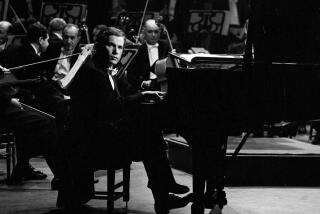Must Reads: Leonard Bernstein at 100: A look at the exasperating genius of the brilliant composer
Please don’t kid yourself that you will be able to escape the sweaty reach of Leonard Bernstein this weekend.
Had he not smoked like a chimney and drank like a fish, not abused his body with uppers and downers, not been a tortured insomniac or tormented spiritual thinker, not been driven and guilt-ridden to distraction, Bernstein might have lived to celebrate his 100th birthday on Saturday.
Had he not conducted exuberant and shamanistic concerts seeming to inject music from his inner being directly into your bloodstream, not written those questing, profound final works, not exhaustively drained his herculean supply of sexual energy, he might not have so early deteriorated into the worn-out wreck who died at 72.
Yet had he not been all those things, would this composer, conductor, pianist, educator and television personality who avidly embraced all aspects and genres of music become America’s greatest musical figure?
His home state of Massachusetts declared Aug. 25 to be Leonard Bernstein day. Hundreds of Bernstein recordings have been remastered, repackaged and released in lavish box sets, along with major new recordings of Bernstein works. Three illuminating Bernstein books have been published. Performances have been nonstop. Dueling biopics, starring Jake Gyllenhaal and Bradley Cooper, are in the works.
The conventional wisdom is that Bernstein’s brilliance was in his youth. The flashy star conductor, who could write such groundbreaking Broadway shows as “On the Town,” “Wonderful Town,” “West Side Story” and “Candide” while at the same time compose precocious ballet scores and concert pieces, remains larger than life. His Young People’s Concerts are the perfect example of what made the 1950s a golden age of television. During his historic tenure as music director of the New York Philharmonic between 1958 and 1969, he made and sold LPs like they were going out of style.
Somewhat less than half of those early recordings have been expertly assembled into a 100-CD Sony Classical set, “Leonard Bernstein Remastered.” The collection does not include all the major recordings — notably complete cycles of Mahler, Beethoven or Sibelius symphonies — but what is there has never sounded more electrifying. These can also be found online in high-resolution downloads that come closer than ever before in reproducing the full voltage that was felt in the concert hall.
After the New York Philharmonic years Bernstein began what has been regularly characterized as a downhill struggle with grandiosity, alcohol and sexual liberation that led to increasingly grotesque behavior, outrageously elongated interpretations of the classics and embarrassing self-indulgent pieces in which he argued with God, nature and family. In her 1987 biography, Joan Peyser implied that only when Bernstein led a relatively conventional family life in the 1950s and ’60s was he successful.
With his 1971 “Mass,” Bernstein let it all out, the “all” being musical and sexual. He set out to conquer Europe, beginning a romance with the Vienna Philharmonic. He set out to conquer his own urges, beginning a romance with an intellectually stimulating young man, Tom Cothran, that broke up his nearly 25-year marriage with Chilean actress Felicia Montealegre.
Although he eventually returned to his wife shortly before her death, he did appear, on the surface, unmoored. He took up with one young man after another. Composing became laborious, and the pieces he wrote did not ingratiate. They still don’t and have not been much featured in the Bernstein year. From new memoirs by his oldest daughter Jamie (“Famous Father Girl”) and by his close assistant Charlie Harmon (“On the Road and Off the Record With Leonard Bernstein”) we learn many new details about what an “exasperating genius,” as Harmon puts it in his subtitle, Bernstein could be. In his excellent, new, concise biography, part of the “Critical Lives” series, Paul R. Laird writes that “the final chapter of Bernstein’s life is often a sad journey.”
That final chapter or two is far and away the most documented part of Bernstein’s life. And with all the reissued or newly released recordings and videos, along with the recent memoirs, it is possible to take an unconventional view: Bernstein’s lasting greatness as a conductor and as a composer in his maturity.
A giant new set of complete audio and video recordings on Deutsche Grammophon & Decca provides a thoroughgoing musical account of Bernstein’s final 15 years, and no single collection of any performer can come close to matching it. DG has so far remastered only the Beethoven symphonies in higher resolution audio on a Blu-ray disc included in the set, but nothing is badly recorded and the performances can be life-changing.
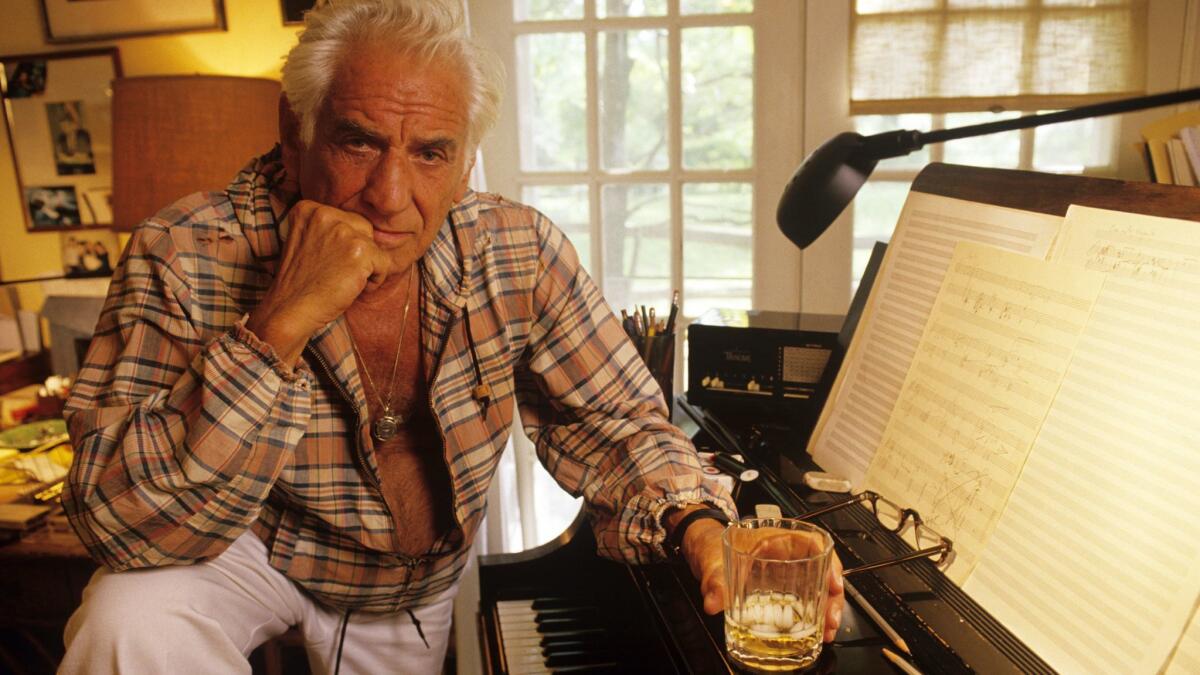
Yes, tempos are arrestingly slow. In her memoir, Jamie Bernstein says she felt he simply didn’t want the music to stop. But only in certain movements of Mahler, where Mahler was himself hanging on to dear life, do I find that to be the case. Nor do I hear Bernstein’s compulsive need to magnify every gesture, merely the expansion of ego, as has been a common complaint. This is, instead, Bernstein the questioner at his most remarkable.
He was obsessed with unanswered questions, taking Charles Ives’ mysterious “The Unanswered Question” as the title of six Harvard lectures he gave in 1973. “I’m no longer sure what the question is,” Bernstein concluded in a series that attempted to find a fundamental syntax of music that justified his own moorings in a then-disputed tonal language. “But I do know that the answer is Yes.” His search for the ultimate question to which he could answer “Yes” got ever more desperate.
Thus, he conducted by slowing everything down and magnifying the music to get inside the score and the composer’s psyche. He had to become Beethoven or Mahler to conduct Beethoven or Mahler (which didn’t make his own protracted composing any easier). His baton became a musical microscope, a tool to discover what a piece is made of and why.
Slowing down is of course natural with age, and Bernstein’s accelerated early development led to his early aging. In his 60s he was already an old man, an old prophet, really, his quest being ultimately spiritual. He could hold a piece together no matter how slow, because to lose the line of thought, to let something fall apart, was to lose its divinity.
In this Bernstein has never had an equal. The spiritual side of him forced him to push whatever envelope presented. The daredevil side of him relied on a second sense for just how far, to the millisecond, he could humanly go before a piece fell apart or became maudlin. His ego meant that he almost never turned back. His rare failures, I would suggest, were when he didn’t go far enough. Comfort zones were — in his life, his music and his conducting — to be avoided at all costs.
This also helps us understand how his behavior and his music were connected. Would we let him today get away with his sexual overtness? Those kisses! He kissed everyone on the mouth — including concertmasters of uptight European orchestras at sweat-drenched curtain calls — and you were more than a little clueless if you didn’t know to keep your mouth shut. He once even grossed out his daughter by sticking his tongue in her mouth. He shamelessly flirted with young men.
Even so, few complained.
An inescapable part of the Bernstein aura was sexual, and he got away with murder. An extraordinary video from 1985 was recently released of Bernstein conducting Haydn’s Symphony No. 88 with the Vienna Philharmonic. For an encore he repeats the last movement, except to the audience he appears not to be conducting at all. He stands there with his hands at his side, and he lets the orchestra do its buoyant thing. Miraculously, the playing has even more personality than it had before.
Thanks to a camera on Bernstein’s face, we can now see the great magician’s trick. He mimics the score with facial expressions that are an act of seducing an orchestra. They verge on the pornographic. Some players look mesmerized, while others try to avoid his gaze. But they can’t. He’s Bernstein as Zeus, a god impossible to deny.
For more sheer Bernsteinian seduction, try the new Warner CD set of recordings in the mid 1970s with the Orchestre National de France (“Leonard Bernstein: An American in Paris”). This includes the short period during which he lived with Cothran, grew a beard and threw caution to the wind, hoping for a new midlife lease on life. The performances here, especially of Ravel and Milhaud, are love letters to Cothran, and that includes the sexiest, most coy “Boléro” on disc.
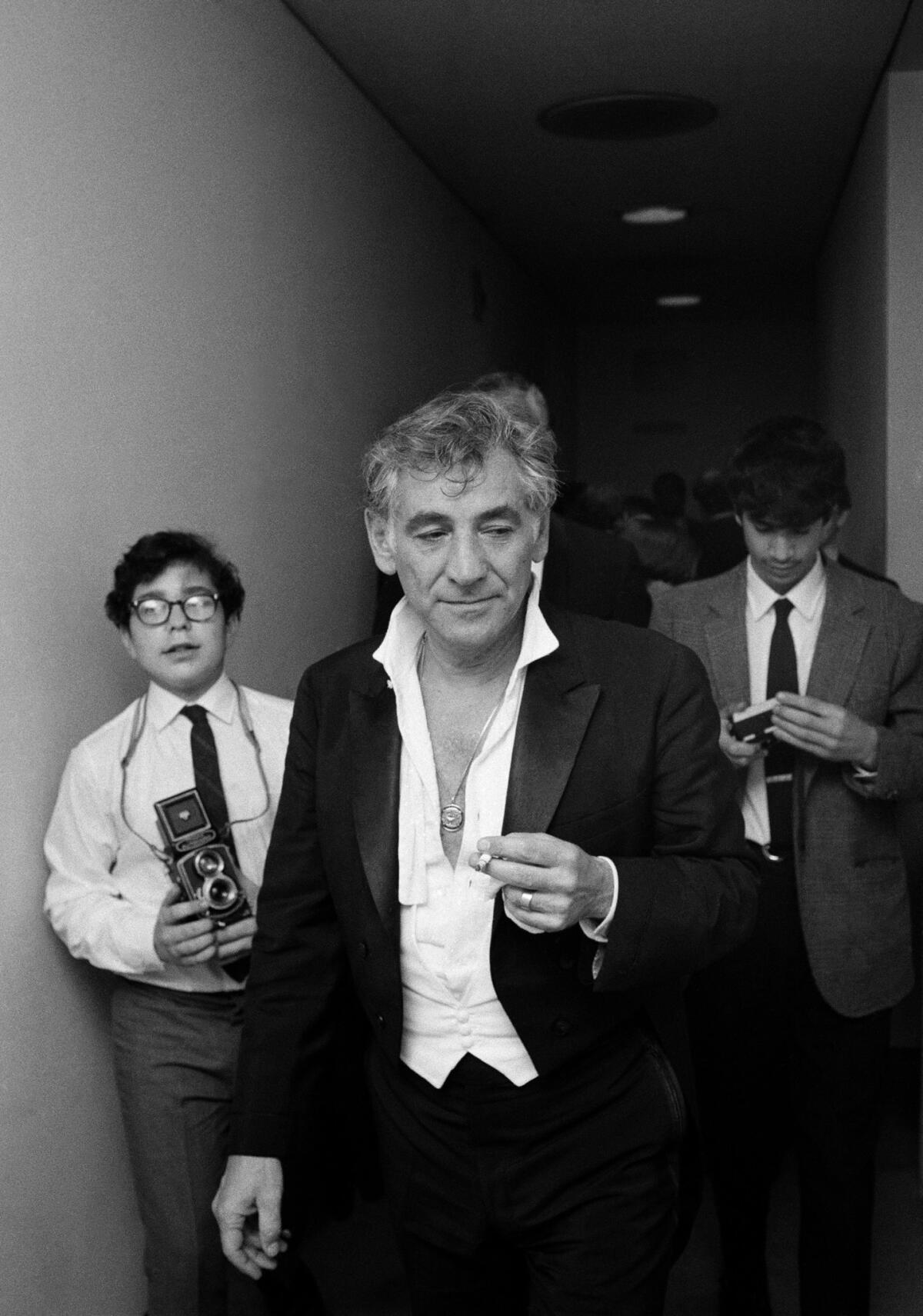
With Bernstein, though, there is acting out and there is acting out. Sex was his way of pushing his demons aside, but they wouldn’t stay aside. In his two biggest, least-loved and I would propose most profound works, the 1974 demon-rich ballet “Dybbuk,” which no one seems willing to tackle, and the opera “A Quiet Place” from a decade later, Bernstein asks his toughest spiritual and personal questions, the ones he knows he will never be able to answer “Yes.”
Bernstein’s lifelong struggle with faith can be found in much of his work and particularly in his three symphonies, written between 1942 and 1977. Each symphony, in its own commanding way, spectacularly strives for redemption. But as Bernstein shows in his own recordings of them, this is never real redemption, just optimism, reassurance in place of redemption. Not quite knowing why, you are left shaken.
The biggest cop-out of the Bernstein year has been an unwillingness, or downright inability, to deal with that. We no longer feel compelled to whitewash the man (welcome to 2018), but the music is another matter. I cannot help but believe that in Bernstein’s own best of all possible worlds, it would have been the other way around.
Take a highly acclaimed new recording of the symphonies with the Orchestra dell’Accademia Nazionale di Santa Cecilia in Rome, conducted by Antonio Pappano. Pappano goes in for unquestioning grandeur, leaving Bernstein to sound like warmed-over Shostakovich’s warmed-over Mahler. You feel good but for no good reason.
Another and far more disappointing new Bernstein recording is Yannick Nézet-Séguin’s soupy Philadelphia Orchestra performance of “Mass,” which has never sounded sappier.
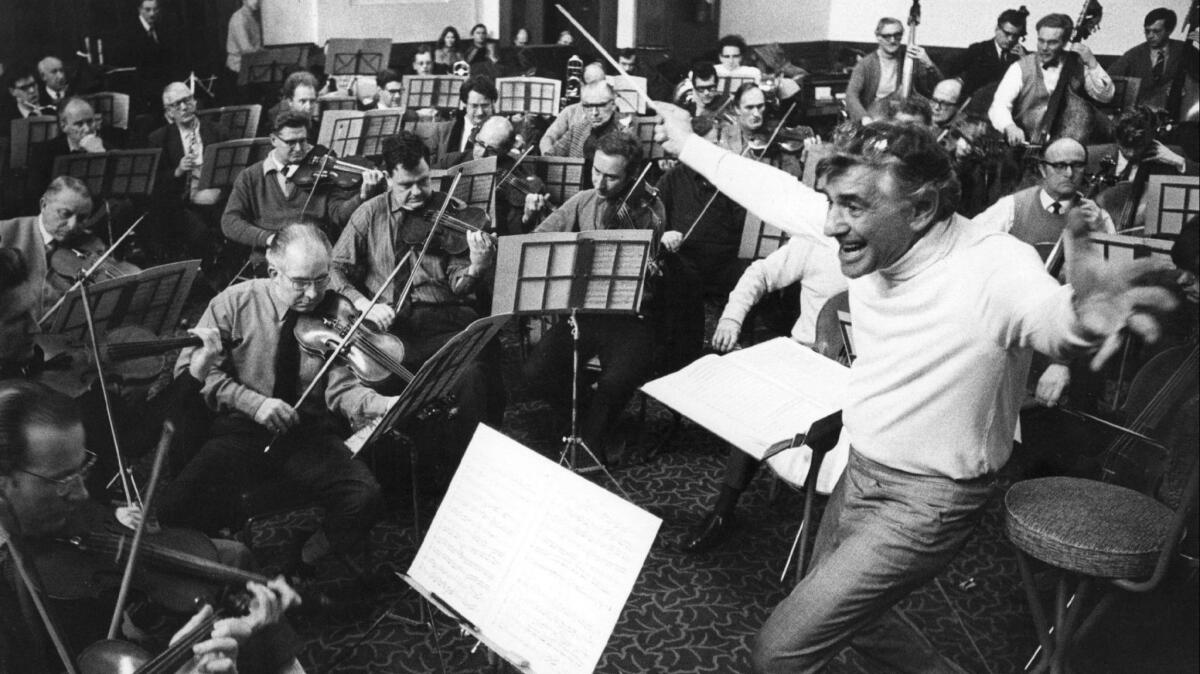
But to make up for all that is a new version of “A Quiet Place,” with Kent Nagano conducting his Orchestre Symphonique de Montreal. This is the most necessary revelation of the Bernstein year.
For background, we have Harmon’s memoir revealing just how out of control Bernstein was writing this troubled opera about a troubled family. We saw a little of his over-the-top acting out during his Los Angeles Philharmonic performances at the Hollywood Bowl in 1982, including a degree of shimmying while playing Gershwin’s “Rhapsody in Blue” that would have been appalling had there been video screens in those days. Yet listen to the performance on the big DG set and a magnificent grandeur makes up for everything.
The opera takes that overwrought, embarrassing grandiosity several stages further, and once you get over being mortified, you start to appreciate the bravery of putting something this authentically raw on the modern lyric stage. Typically, this messy “Quiet Place” has not had much of a place in the unquiet Bernstein 100, outside of a student production at Tanglewood this summer.
Nagano commissioned a new version of the opera for chamber forces that rearranges some of the material and makes new cuts and additions. With a rare eloquence from the pit and with tellingly theatrical singers, Nagano’s new sleek, wrenching account doesn’t replace the overwrought one so much as give another perspective to an opera the essence of which is ever-changing emotional perspectives.
Probably the most quoted line in Jamie Bernstein’s memoir was her mother’s exclamation when Bernstein left her for Cothran: “You are going to die a lonely, bitter old queen.” “A Quiet Place” can now be seen as an opening if not a complete road map out of that curse.
Bernstein’s quiet place in the opera, his most probing work, was to move beyond redemption to something more feasible: acceptance. The 14 years after he finished the opera were obviously lonely. He may never have been alone, but few of his lovers or hangers-on or colleagues could be expected to go deep down that opening with him. He was on his own in one of music’s most powerful spiritual quests. For this, his true partners were the orchestras he conducted and the listeners willing to let him take us to places we could never have imagined.
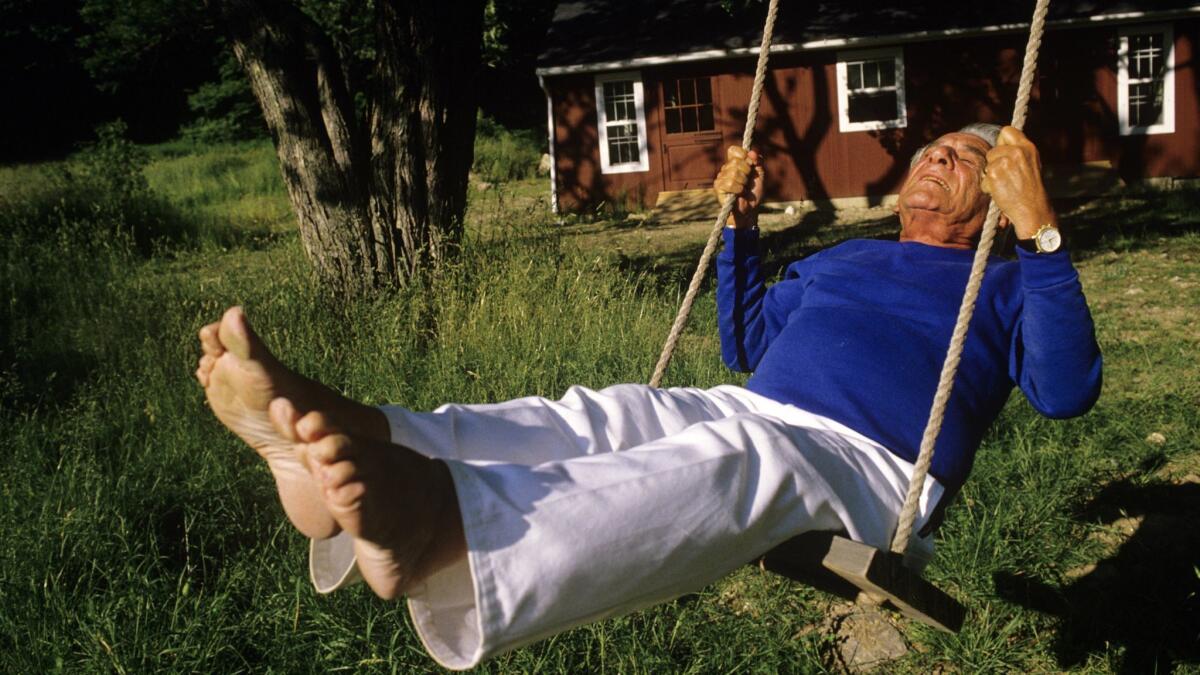
More to Read
The biggest entertainment stories
Get our big stories about Hollywood, film, television, music, arts, culture and more right in your inbox as soon as they publish.
You may occasionally receive promotional content from the Los Angeles Times.


